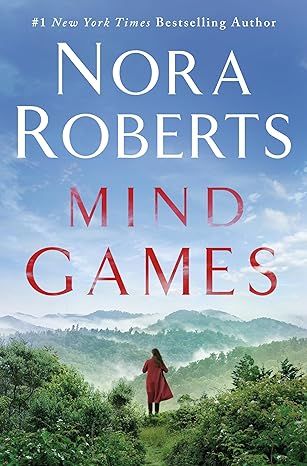Mind Games: A Novel
4.7
-
12,513 ratings
The #1 New York Times-bestselling author of Identity presents a suspenseful new novel of tragedy and trauma, love and family, and the evil that awaits.
As they do each June, the Foxes have driven the winding roads of Appalachia to drop off their children for a two-week stay at their grandmother’s. Here, twelve-year-old Thea can run free and breathe in the smells of pine and fresh bread and Grammie’s handmade candles. But as her parents head back to suburban Virginia, they have no idea they’re about to cross paths with a ticking time bomb.
Back in Kentucky, Thea and her grandmother Lucy both awaken from the same nightmare. And though the two have never discussed the special kind of sight they share, they know as soon as their tearful eyes meet that something terrible has happened.
The kids will be staying with Grammie now in Redbud Hollow, and thanks to Thea’s vision, their parents’ killer will spend his life in supermax. Over time, Thea will make friends, build a career, find love. But that ability to see into minds and souls still lurks within her, and though Grammie calls it a gift, it feels more like a curse―because the inmate who shattered her childhood has the same ability. Thea can hear his twisted thoughts and witness his evil acts from miles away. He knows it, and hungers for vengeance. A long, silent battle will be waged between them―and eventually bring them face to face, and head to head…
Kindle
$14.99
Available instantly
Audiobook
$0.00
with membership trial
Hardcover
$15.00
Paperback
$19.00
Ships from
Amazon.com
Payment
Secure transaction
ISBN-10
1250911036
ISBN-13
978-1250911032
Print length
432 pages
Language
English
Publisher
St. Martin's Griffin
Publication date
May 05, 2025
Dimensions
5.38 x 1 x 8.25 inches
Item weight
1 pounds
Popular highlights in this book
Sleep, peaceful sleep, be with me tonight, and stay with me till the morning light.
Highlighted by 174 Kindle readers
Grieving takes its own ways, its own time. Whenever you need to cry, you cry. But you have to laugh, too. You have to eat and sleep and wash your face, brush your hair, and all that regular stuff.
Highlighted by 77 Kindle readers
There would always be a before, and there would come an after. And this moment forever separated them.
Highlighted by 70 Kindle readers
Product details
ASIN :
B0CGRYWVJD
File size :
7839 KB
Text-to-speech :
Enabled
Screen reader :
Supported
Enhanced typesetting :
Enabled
X-Ray :
Enabled
Word wise :
Enabled
Editorial reviews
"Fans of Roberts’ enticing brand of storytelling will find everything they crave in her latest polished thriller, including compelling characters, an evocative, richly realized setting, and a captivating plot enlivened a generous dash of romance and just the right measure of nerve-jangling, nail-biting suspense. You don’t have to be a mind reader to predict Roberts’ latest will soon be on reserve and best-seller lists all around the country." ―Booklist
"Roberts’ latest may move you to tears, or joy, or dread, or all three....A touching story of love and grief ends in an epic battle of good versus evil." ―Kirkus Reviews (starred)
"Die-hard Roberts fans will get what they came for: there’s no shortage of romance, [or] cliffhangers..." ―Publishers Weekly
Sample
Chapter One
For Thea, the very best part of summer started the second week of June. The last day of school earned a big red heart, and meant she could start swimming and splashing around in the backyard pool, which she loved. She could ride her bike and play with her friends every day. Though they didn’t call it playing anymore. Now they hung out.
She was twelve, after all.
She liked cookouts, and long summer days, and she especially liked no homework.
But every year, just about a week after that big red heart day, she piled in the car with her mom; her dad; her little brother, Rem; and their dog, Cocoa. They started the long drive from Fredericksburg, Virginia, to Redbud Hollow, Kentucky.
Her mom grew up there but had gone off to Virginia to college, where she met John Fox on the very first day in the very first class.
And the rest, like they said—or like her dad said—was history.
They married the summer after their sophomore year, and ten months, two weeks, and three days after, she’d come along. Not quite two years later, Rem popped out.
Now her dad designed houses and her mom decorated them. Their company, Fox and Fox Homes, did just fine.
She knew stuff. Grown-ups didn’t think kids knew much of anything important, but she did. She knew her grandparents, her dad’s parents, were rich and snooty, and didn’t think much of her mom—the girl from eastern Kentucky.
But her dad’s parents lived out in San Diego, so they didn’t have to see them much. Which was more than fine with Thea. She didn’t have to hear Grandmother—that was the snooty name they had to call her—think her thoughts about how her mom laughed too loud or would never shake the Appalachian dust off her shoes.
She could hear those thoughts if she tried hard enough, and when she had to visit Grandmother, she couldn’t seem to help it.
She thought so loud.
Grandmother and Grandfather didn’t seem to care that John and Cora Fox were happy, and even successful. That they all lived in a pretty house in a nice neighborhood. That Thea and Rem (or as they insisted, Althea and Remington) did even better than okay in school.
But Grammie cared. They all talked on the phone every week on Sunday, and at Christmastime, Grammie drove up with her truck full of presents she’d made. Most of the time her uncles Waylon and Caleb came, too, so they had a big family party, and the house was all full of music and lights and the smells of baking.
That was her second favorite time of the year.
But the best time, even though they had to drive for seven whole hours, and sometimes more, came in June.
They always left bright and early, and passed the time with Road Trip Bingo. Rem usually fell asleep, and sometimes she did, too, but they always gave a hoot and holler when they crossed the line into Kentucky.
They stopped for barbecue and hush puppies—that was tradition. She’d be hungry when they did, but always wished they could just keep going, keep going and get there.
Keep going over roads that started to twist and climb, over bridges that spanned rushing rivers.
She loved watching the mountains happen, those rolls and peaks of deep green that were somehow sort of blue, too. The plateaus and ridges, the forests and streams.
And when she was in it, deep in those rolls and peaks where the road wound and wound, she knew her pretty house and really nice neighborhood in Virginia could never compare.
She wondered how her mother could leave it all, and whenever she asked, Mom always said: “I had to meet your daddy, didn’t I? Or else you wouldn’t be here asking me.”
She knew it was more. She knew her mother had wanted that pretty house and nice neighborhood. Knew, in her heart, her mother had wanted to shake that Appalachian dust off her shoes.
She didn’t say so, or else Mom would get that look in her eye. She didn’t want Thea to know things, like when Dad said: “Where the hell did I put my keys this time?”
And she knew he’d tossed them on the kitchen counter, then laid some of his paperwork over them, even though she’d been outside when he did it.
So she knew regardless of the fact that her mother loved Grammie, she wanted something more than the house in the hollow and wanted less than what she’d left behind.
She didn’t think about that now, as they skirted around the mountain town of Redbud Hollow with its climbing streets and shops like Appalachian Crafts, where Grammie sold her soaps and candles and such.
Because at last, at last, they were almost there. The sun still shined bright. Through the sunroof she watched a hawk circle. Deer walked through the woods here. Sometimes she saw deer in the neighborhood yards back home, but it wasn’t the same!
Her mom always drove the last leg of the trip, along the roads she’d once walked as a girl. And when they rounded the last curve, Thea saw the house.
Painted blue as the sky, with shutters—real ones—and the posts of the long front porch green as the hills, it sat back from the skinny, snaking road. Azaleas and mountain laurel flowed along the front. Dozens of colorful bottles hung from the branches of a redbud tree.
Thea had never seen it blooming, except in pictures, because school, but she could imagine it.
In the back there would be gardens—flowers and vegetables and herbs—and the chicken coop where Grammie’s ladies clucked and pecked. The goat named Molly had a pen, the cow called Aster had two small fields where Grammie moved her from one to the other every few months.
There was a little barn and a garden shed. A stream meandered through and slid right into the woods.
And the hills rose up, all around.
Duck and Goose, Grammie’s two coonhounds, raced around the house toward the car.
In the car, Cocoa rose up to wag and whine.
The minute Thea opened the door, Cocoa leaped over and out. The three dogs began to sniff butts to reacquaint themselves.
The door of the house opened, and Lucy Lannigan stepped out on the wide front porch.
Her hair, the true black she’d passed to her daughter and granddaughter, had a thick white streak, like a wave, from the center down to the tip on the right side. She’d passed on the lapis-blue eyes as well with their long lids.
Her height, five-ten with a willow-stem frame, had missed Cora, but from the length of Thea’s and Rem’s legs, it wouldn’t miss her grandchildren.
In her faded jeans and simple white shirt, she threw open her arms.
“How many can I hug at once? Let’s find out.”
Like Cocoa, Thea and Rem jumped out, and they ran into the open arms of the woman who smelled like bread fresh from the oven.
Lucy said, “Mmm-mmm-mmm!” as she hugged and squeezed, then managed to gather in Cora and John. “Now my heart’s full to brimming. I’ve got all the love in the world and more right here on my front porch. I hope you’re hungry, ’cause I’ve fried up enough chicken for an army after a hard battle.”
“I’m starving,” Rem told her, and brought on her rolling laugh.
“I can always count on you for that. There’s fresh lemonade for some, and some damn good apple wine for others. Your rooms are all ready if you want to stow your bags away.”
“Let’s do that.” John kissed both Lucy’s cheeks. “Then I could sure go for that apple wine.”
The house always smelled so good. To Thea it smelled of the mountains and good cooking, of herbs and flowers.
She’d only been to Grammie’s house in the summer, so she’d never seen a fire crackling away in the living room with its big old blue couch and armchairs covered in what her grandmother called cabbage roses.
And there were flowers from the garden, and wildflowers from the hills, the candles Gram made herself, and always the latest school pictures of her and Rem in frames.
Her dad helped carry the bags up while her mom went into the kitchen with Grammie. Because, her dad always said, they liked a little mom-and-daughter time.
Thea didn’t mind because she’d have two whole weeks.
She loved her room here with its view of the mountains. Though it was smaller than her room at home, she didn’t mind that either.
She liked the old iron bed, painted white as snow, and the quilt covered with violets her grandmother’s grandmother had made. White daisies stood happy in a little glass pitcher on the dresser. Though the room had a tiny closet, it also had what Grammie called a chifforobe.
Thea liked it better than any closet.
And she liked knowing her mother had slept in that room as a girl.
Rem had the room right across—Uncle Waylon’s childhood bedroom—and then her parents would take Uncle Caleb’s old room for the night. One more bedroom Gram had set up for sewing and things, then she had the biggest room with the four-poster bed that had come down to her.
A bed she’d been born in.
Thea couldn’t quite imagine that one.
Because she wanted to feel like she was really here, she unpacked even when she heard Rem run back downstairs.
After she put her clothes away, the room became hers.
Downstairs, she took her time. The living room, then the parlor with its old TV and its much, much older big radio. The easy chair and divan, the books on shelves, the basket of yarn, the cuckoo clock on the wall.
Then the room with the upright piano, the banjo, the guitar, the mandolin, the dulcimer.
Grammie could pick up any of those if she had the mood and play. She knew Waylon could do the same, not only because Grammie said so, but he always brought a banjo or guitar to play at Christmastime.
Plus, he made his living playing them in Nashville, where he lived. Caleb could play, too, but he’d gone to college to study theater and acting and stuff, so he did that.
Her mom played sometimes, but Gram said Cora’s instrument was her voice. And Thea knew that for truth, as her mom—especially when she was happy—sang like an angel.
But in the whole house, the kitchen was her favorite.
It was massive—one of her current favorite words. Big enough for the kitchen table Gram’s grandpappy had built out of solid oak. It had a six-burner stove Gram bought when she’d made some changes, but she wouldn’t part with the table.
She called it the heart of her kitchen, and her kitchen the heart of her home. She had lots of cupboards and long, long counters, a whole wall of shelves holding pots and cookbooks of family recipes and glass jars of rice and oats and pasta and grits, beans, colorful jars of pickled beets and chowchow and peppers and apple butter and more.
Open to it, the craft kitchen with its big stove had sturdy work counters and shelves holding bottles and jars and tools. Grammie grew herbs in pots in the sunny windows and had more hanging to dry.
There she made her candles, her soaps, her lotions and medicinals for her business.
In what had been a pantry, Grammie kept a supply of what she’d made, in case she wanted to give a gift, or somebody came down from the hills to barter.
Always curious, Thea opened the door and breathed it all in as she looked at the shelves.
To her, it smelled like a garden planted in heaven.
Roses and lavender, rosemary and sage, heliotrope and pine, lemon and orange and fresh mown grass.
Grammie called her business Mountain Magic, and that’s how Thea thought of it.
She saw the apple stack cake still wrapped on the counter, so she’d keep room for dessert after fried chicken.
Outside, Rem already ran around with the dogs, while her parents and Grammie sat on the back porch with their apple wine.
Through the open windows she could hear the dogs barking, the chickens clucking, her grandmother’s laugh.
She made a picture of it in her head, one she could take out sometime when she felt lonely or sad about something.
“There’s that girl,” Lucy said when Thea came out. “Get yourself some lemonade before Rem sucks that pitcher dry. Being a boy of ten’s thirsty work.”
“Needs to run off being cooped up in the car.” Smiling, Cora reached over, brushed a hand down Thea’s arm. “All settled in?”
“Uh-huh. Can I go see the animals?”
“Sure you can.”
“A little later, you and Rem can give them their evening meal. Go on.” Lucy gave her a little pat on the butt. “Stretch those long legs. We’ll call when it’s time for supper.
“Growing like weeds,” Lucy murmured when Thea raced off. “Both of them. I’m so grateful you give them over to me for this time every summer.”
“They love you.” John reached for the jug, topped off their wine. “They love it here. And, I can’t lie, two weeks alone with my bride?” He winked at Cora. “That’s a gift.”
“And they’ll come home with half a million stories.” Cora leaned back in her rocking chair, relaxed as the travel fatigue, and the faint headache that came with it, drained away. “The fox the dogs chased away from the chicken coop, the fish they caught or almost caught, milking the cow, milking the goat, the old man leaning on his walking stick who came by for some ointment for his arthritis.”
“And,” John added, “they’ll bring home soap you helped them make, and ask why we never have buckwheat cakes for breakfast.”
“I love them to pieces and back again. One of these days, Waylon and Caleb are going to settle down and give me more grandbabies—since the two of you seem to be finished there.”
“We hit the grand prize with two.” John toasted her.
“Well, from where I sit you surely did. I’m hoping my boys and their ladies-to-come will be as generous as you, and give me the time to watch those babies grow. Means the world to me.”
“We’re never going to talk you into moving to Virginia, are we, Mama?”
Lucy just smiled out at the mountains.
“I’m an Appalachian woman, darling. I’d wither away if you planted me somewhere else. Now, I’m going to go make some buttermilk biscuits. No, you sit right there,” she ordered. “You’ve had a long drive, and I haven’t. Tonight I get to spoil my grown-up babies, too.”
“You spoil us all, Lucy, and we’re grateful you do, you will.”
When Lucy went inside, John reached over to squeeze Cora’s hand. “Go on in and talk to her about our compromise. See what she thinks while the kids are occupied.”
With a nod, Cora rose and went inside.
She sat at the island while Lucy grated butter she’d frozen into a bowl of flour.
“You got your something-to-talk-about face on.”
“I do, and we think it’s a good thing. I hope you will.”
“I’ve got my I’m-listening ears on, baby mine.”
“I miss you, Mama.”
Lucy’s hands stilled a moment, and her heart swam into her eyes. “Oh, my darling girl.”
“I know your home’s here, and you know I made mine in Virginia. But it’s not so big a distance, not really. I miss my brothers, too. Never thought that’d happen,” she added, and made Lucy laugh.
“They surely did dog their big sister. But they loved you, just like those two outside love each other. Brothers and sisters, they gotta squabble. It’s a job of work.”
“Well, we did our job of work, that’s for certain. Caleb’s moving to New York City.”
“He told me.” After tossing the butter and flour, Lucy set it in the refrigerator to chill a few minutes. “Just like he told me there was this newfangled invention called an airplane, and he could use it to come back to the homeplace and see me. And how I could do the same to go up there so he could take me to see a Broadway show.”
“It’s a chance for him to do what he loves, and what he wants, but we won’t see as much of him as we did when he lived in DC. And Waylon’s mostly in Nashville or traveling.”
“My minstrel man.”
“Mama, you know John’s family…” She trailed off, glanced out toward the back porch. “They don’t think much of us. Me anyway. And they’ve got no interest in the kids.”
“That’s their very great loss.” Lucy’s mouth tightened before she said something she shouldn’t. “I feel sorry for them and their closed-off hearts.”
Or she tried to.
“That man out there—the one running around with his children after driving all this way? If I could’ve imagined just the right husband for my girl, just the right daddy for my grandbabies, I couldn’t have imagined better than John Fox. He’s as dear a son to me as the ones I birthed.”
“I know it. More, John knows it. And you’re more a mama to him than his own.”
“Another blessing for me. Another reason to feel sorry for the one who can’t see the gifts laid in front of her.”
Cora rose to make sure John was out of earshot. “You know what they did for Thea’s twelfth birthday? Sent her a card with twelve dollars inside. One for each year. It came a week late on top of that. It’s not the money, Mama,” she said quickly. “We don’t care they’ve got piles of it. We’re all doing fine. It was … The card said ‘Happy Birthday, Althea. Your Grandparents.’ That’s all it said.”
Lucy picked up her wine, took a small sip. “Did you have Thea write them a thank-you?”
“I didn’t have to. She sat down and wrote one: ‘Dear Grandparents, Thank you very much for the birthday wishes and the twelve dollars. I hope you both are well. Your granddaughter, Thea.’”
Lucy gave a nod of approval. “You’re raising her right.”
“As I was. It burned me inside, Mama, and it hurt John. He tries to not let it hurt, but it does. I don’t want our family to ever grow apart and careless like that.”
“We never could, darling.”
“But people get busy. You’re busy, Mama, with your home, your business. Caleb and Waylon are busy, and like you said, they’ll likely start families of their own and get busier yet. John and I, we’re busy raising the kids, with our business. And, Mama, twice a year, it’s not enough.”
She wandered as she spoke while Lucy watched and thought: my clever, restless girl.
“You made an apple stack cake,” Cora murmured.
“Of course I did. It’s John’s favorite.”
“I don’t know why things like an apple stack cake and flowers on the table mean more to me now than they did when I was a girl in this house, or why this house is more special to me now than it was when I was living in it.”
“You were looking ahead, and away, Cora.”
“And you let me. One day, Thea’s going to look away, so I understand what I didn’t, how much it costs to let a child live their own.”
“It costs,” Lucy agreed as she got the bowl and the buttermilk out of the refrigerator. “But it pays off so in pride of what you see that child become. And I’m so proud, Cora, of the life you’ve made, of the person you are. So proud.”
“I didn’t appreciate you enough when I was a child.”
“Oh, stop that.”
“I didn’t,” Cora insisted as she watched, as she had countless times before, her mother make a well in the flour and grated butter before pouring the buttermilk into it.
It made her smile, so she asked what she’d asked countless times before. “Why do you stir it with that wooden spoon fifteen times? Exactly.”
Their eyes met as Lucy smiled back, and answered as she had countless times before. “Because fourteen’s not enough, and sixteen’s too many.”
“I didn’t appreciate, Mama, how hard it was for you, especially after Daddy died. How hard you worked to keep it all going, to keep a roof over our heads, food in our bellies, to push your business on so you could. I didn’t appreciate it enough because you made it look—”
Cora shook her head as she wandered the big kitchen again.
“Not easy, not really easy—but natural. Like loving us was natural, and keeping the music playing, making sure we got our homework done, brushed our damn teeth, all of it, just natural, just life. Saving, like you and Daddy started, so we could go to college, just part of the whole.”
“Your daddy didn’t want his boys in the mines. He went down so they never would. He wanted—we wanted—our children to get a good education and have choices.”
Lucy dusted the counter with flour, turned the dough on it, dusted the top, then rubbed more on her old wooden rolling pin.
“Your choices, the lives you’re making with them, honor your daddy, and his sacrifices.”
“And yours, because you clearly made sacrifices, too. I see that, now. So twice a year isn’t enough, not for family.”
Lucy rolled the dough into a rectangle, then folded the short ends together and rolled once more. With a glance at her daughter, she did the same again.
“You’ve got a plan in there somewhere.”
“We do, John and I. We’d like to come down more. The Easter break at school, and Thanksgiving.”
Once again, Lucy’s hands stilled. “Cora, I’d be thrilled. And oh so grateful.”
“But that’s not all. We know it’s harder for you to travel. You have to have someone tend the animals, but if you could pick just one time to come up, even for a few days, or with Caleb in New York, maybe we could all go up there for a few days, or to Nashville to Waylon. And the kids, they love it here and those two weeks you give them means the world because that’s the start of the summer. We like to take them for a week at the beach before school starts again.”
“They love that week. I get lots of pictures and stories.”
After the last fold and roll, Lucy dipped her round cutter in flour and made her dough rounds.
“We want you to come. We want everybody to come if they can. So we’ve rented a great big house on the beach in North Carolina. A week in August. We’re going to fly you there in that newfangled airplane.”
“Fly? But—”
“Please don’t say no. Waylon says he’ll talk Granny into it, and you know he can talk a man dying of thirst to hand over his last drop of water. We hardly ever see her since she married Stretch and moved down to Atlanta. We’d have a real Riley-Lannigan-Fox family reunion. And if Uncle Buck, Aunt Mae, and the cousins want to come, well, we’ll just get a second house to hold us all.”
Lucy had never been on a plane in her life—though she’d seen that coming in her future with a son living in New York City.
And she saw, very clearly, how much this meant to her girl. The girl who’d always looked forward and away had looked back some. And looked toward family.
“Well, I guess I’d better get these biscuits in the oven, get this meal on the table so I can think about buying myself a bathing suit.”
“Mama!” With a hoot of delight, Cora threw her arms around Lucy. “Oh, the kids are going to go crazy when we tell them. I want them to have what I had growing up, and damn it, I want John to have what he didn’t.”
“Then let’s get the table set. We’ll call them in to wash up, and lower the boom.”
They feasted on fried chicken and potato salad, snap beans and buttermilk biscuits. And Cora had it right, the kids went crazy.
It filled Lucy’s heart to have them filling her home and saturating it with the happiness they generated.
Her restless girl had found her center, and reached a point in her life where she wanted to open it to the people and places of her origin.
She’d had a part of that, Lucy thought, and now an invitation to take a bigger part.
In later years, she’d look back on this simple family meal at summer’s beginning and remember the sound of children’s voices, so high and bright. She’d remember the laughter in her daughter’s eyes, and the utter contentment in the eyes of the man who was a son to her.
She’d think of the breeze fluttering through the open windows, and the screen door where the dogs lay just outside hoping for scraps.
She’d remember how the evening sun had slanted its light over the mountains and how blue the sky held above them.
She’d remember all of it, and hold on tight.
Read more
About the authors
Nora Roberts
Nora Roberts is the #1 New York Times bestselling author of more than 200 novels, including Shelter in Place, Year One, Come Sundown, and many more. She is also the author of the bestselling In Death series written under the pen name J.D. Robb. There are more than five hundred million copies of her books in print.
Reviews
Customer reviews
4.7 out of 5
12,513 global ratings
marti w.
5
Amazingly Good Book
Reviewed in the United States on August 3, 2024
Verified Purchase
This one was true Nora Roberts. Wonderfully real characters, different plot twist, and pure love after the evil. There. Now you read it.
Glenda
5
A Quite Extraordinary Story...
Reviewed in the United States on June 9, 2024
Verified Purchase
I don't think I could ever have fully understood the scripture quoted, Proverbs 27:4, at the beginning of the book, if I had not read this extraordinary story. How does one get to the point that envy and greed justifies everything else that an individual does in their life... Even Murder... And yet it happens, even more often these days, it seems...
Roberts latest novel, Mind Games, is well worth your consideration... It is unique yet the majority of the book's setting is one very similar to mine--in the country, taking care of farm animals, and meeting neighbors... Yet, for the main character, it is sometimes a scary--a very scary place!
Thea, who was just 12 that year, and Rem, her younger brother have just arrived at their grandmother's farm where they spend a full two weeks of the summer each year... They travel from Virginia, which is not too far away, to RedBud Hollow, Kentucky. For these children, visiting the farm is the best part of each year. This year is different, however, they will not be going back home... And they would have been thrilled, under different circumstances... But Lucy, their grandmother had been contacted to let them know that her daughter and son-in-law had been murdered! Even before that, though, both Lucy and Thea had known they were dead... This supernatural "gift" was passed down through the women of their family. Lucy found that Thea was much more attuned to things than even she. And that was what had caused the beginning of her nightmare, which would last for years... Thea had actually seen the murder happening and could identify the man who killed her parents!
Fortunately, for readers, Roberts has built a fascinating tale around the kind of life that happens in rural areas... Neighbors were close, bartering goods, or just providing to those in need... Lucy was a true homemaker, creating candles, soaps and other medicinal articles that were sold locally. Lucy was often the only person who was able to help when somebody was "ailing..."
The major concern for the two children was getting started at a new school, but by that time, they had met neighborhood children and were helped through that sometimes difficult time when needing to meet new people, and hopefully become friends, came about. Thea and Rem were also from their city life, fully active in gaming. But here, too, Thea was ahead because of her strong creative storytelling skills. In fact, the very first game she created, got her into training and then her first game was sold...
Other than the book trailers above, I've decided not to reveal anything other than that Thea identified the man who killed her parents. Sufficient enough to allow police to make a quick arrest. What I'm "not" talking about is that portion of the book that moves into thriller mode, like no other I've ever read about. The imagination, plus the technical gaming study required by the writer to be able to tell this story, is outstanding--both exciting and a touch of horror moves this multi-genre novel to the best of the best of books I've read by Nora Roberts, and under her pseudonym, J. D. Robb (which had always been my favorite books from her.)
The merge of the country setting and all it entailed results in a fascinating, unbelievable story that will awaken you to hoping for the possibility of seeing more of Thea and Lucy, along with the main characters, in a series... Thea's, especially, development is compelling, extraordinary and worthy of...seeing more of her in action! Highly recommended.
GABixlerReviews
Read more
16 people found this helpful
Constance W. Baldwin
5
Mind Games
Reviewed in the United States on July 25, 2024
Verified Purchase
As always, Nora Roberts comes through with an exciting, sweet, kind, romantic novel with a twist of the supernatural. Excellent characters and well developed. I enjoyed every page and character. Thank you!
3 people found this helpful
Top Nora Roberts titles
View all
Dance of Dreams
4.4
-
2,545
$7.99
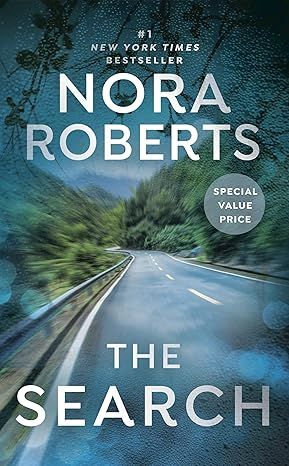
The Search
4.6
-
17,581
$3.33

Whiskey Beach
4.5
-
29,392
$3.33
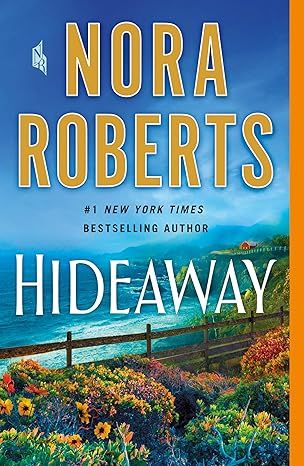
Hideaway
4.5
-
28,237
$1.93
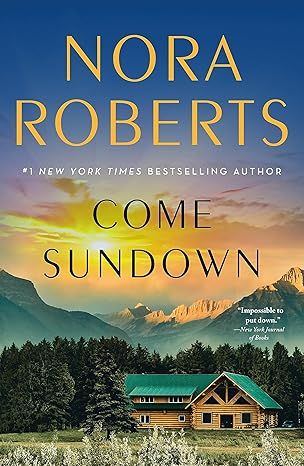
Come Sundown: A Novel
4.5
-
28,396
$8.99
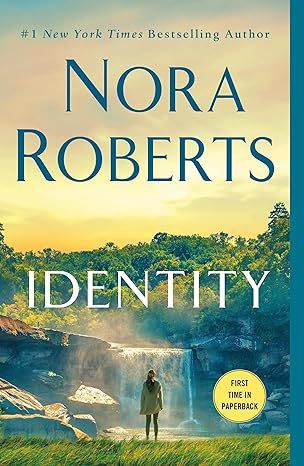
Identity
4.7
-
33,614
$11.98
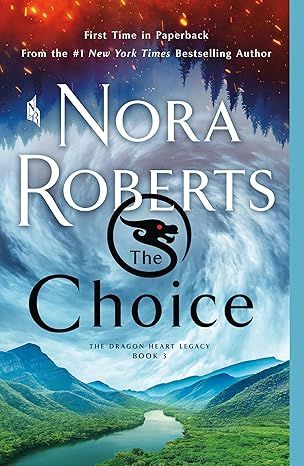
Choice (The Dragon Heart Legacy, 3)
4.7
-
22,366
$12.99
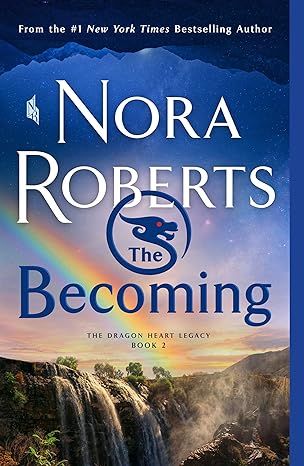
Becoming (The Dragon Heart Legacy, 2)
4.7
-
26,424
$9.99
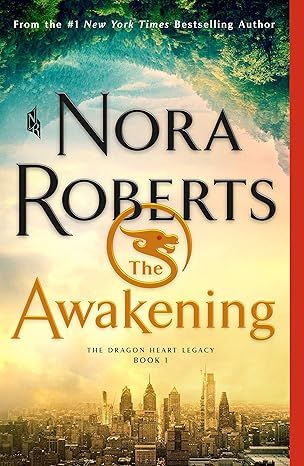
The Awakening: The Dragon Heart Legacy, Book 1 (The Dragon Heart Legacy, 1)
4.7
-
31,307
$9.55
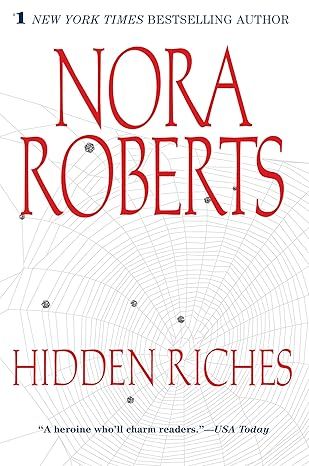
Hidden Riches
4.6
-
9,512
$2.99
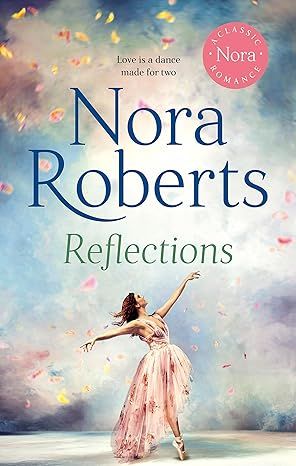
Reflections (Bannion Family)
4.4
-
2,823
$7.99
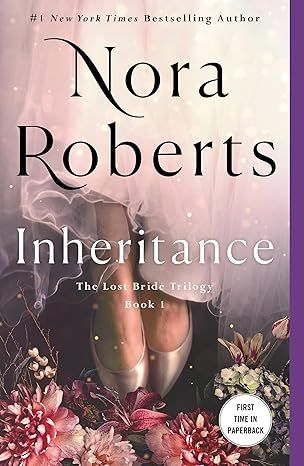
Inheritance: The Lost Bride Trilogy, Book 1 (The Lost Bride Trilogy, 1)
4.7
-
22,046
$14.99
Similar Books
Best sellers
View all
The Tuscan Child
4.2
-
100,022
$8.39

The Thursday Murder Club: A Novel (A Thursday Murder Club Mystery)
4.3
-
155,575
$6.33

Sapiens: A Brief History of Humankind
4.6
-
140,302
$13.49

The Butterfly Garden (The Collector, 1)
4.3
-
88,556
$9.59

Things We Hide from the Light (Knockemout Series, 2)
4.4
-
94,890
$11.66

The Last Thing He Told Me: A Novel
4.3
-
154,085
$2.99

The Perfect Marriage: A Completely Gripping Psychological Suspense
4.3
-
143,196
$9.47

The Coworker
4.1
-
80,003
$13.48

First Lie Wins: A Novel (Random House Large Print)
4.3
-
54,062
$14.99

Mile High (Windy City Series Book 1)
4.4
-
59,745
$16.19

Layla
4.2
-
107,613
$8.99

The Locked Door
4.4
-
94,673
$8.53
